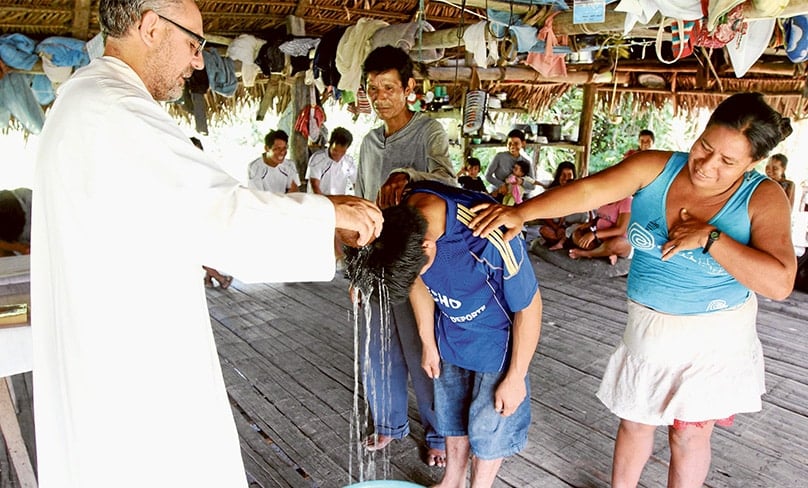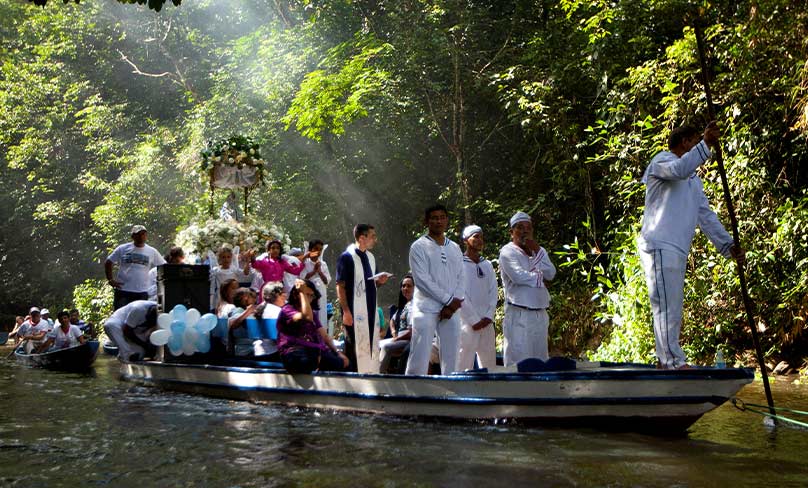
One of the funniest things about the recent Amazon synod is the pushback from the men on the ground – bishops in South America who have been facing the frontline issues for years.
Bishop Johnny Eduardo Reyes of Venezuela made headlines when he suggested that there were an awful lot of priests ‘studying’ in Rome who might be useful in the mission areas of the Amazon.
Certainly only 15 to 30 per cent of Italians go to Mass regularly, in a country with currently about 45,000 priests. That works out to one priest for every 400 practising Catholics, tops.
Reyes is right. We don’t have a priest shortage; we have a priest distribution problem.
But he also touched on a more sensitive issue: why so many priests and religious from developing countries end up living permanently in Western countries.
For example, Nigeria has a thriving Catholic population of about 52 million people, of whom around 89 per cent attend Mass on Sundays, but with only about 4,000 priests.
That’s one priest per 11,500 practising Catholics. In Vietnam, where the Church is finally beginning to operate more freely, there are around 6.5 million practising Catholics with only 2668 priests, or one priest for every 2,300 practising Catholics.
We know that men and women in the West don’t accept the call to religious life any more for a range of reasons, although there are signs of resurgence.
For people in developing countries, with fewer choices, religious life can look more attractive. It’s more like the early Church, where your choices were arranged marriage and early death in childbirth versus a convent where you might learn to read and write.
Alternatively, you could do backbreaking farm work from dawn till dusk, or you could go to a monastery where you might get a break from farm work and also learn to read and write.
It’s hard to talk about this in the Church in Australia today. Liberals decry this discussion as racist, and conservatives decry this as a smear on the fidelity and orthodoxy of the Catholic developing world.
But this also tends to posit people in developing countries as essentially different from us, which is not true. They are the same type of people as we are: a mix of sinful and holy.

It’s also the same argument rightly used against the mass importation of Filipino nursing staff to work in Britain’s National Health Service when they are desperately needed in their own country’s struggling hospitals.
It might help to see things on a spectrum. At one end it’s positive: priests and religious from developing countries are on a mission to the spiritually dying West. They will keep the Church alive here and hold off the incursion of irrelevant lay leadership.
At the other end of the spectrum, it’s more cynical: some priests and religious can see opportunities in affluent Western countries, and take them, preferably permanently.
We are complicit in this: their presence here helps us to avoid the dramatic but unpopular restructuring and redistribution of local clergy, parishes and dioceses which the Church desperately needs.
Religious communities are not exempt from this. Many European religious orders gave up on trying to attract local vocations, and are now moribund with a handful of increasingly ancient members. Foundations in developing countries offer a pipeline to young and energetic members who can do the heavy lifting.
In communities with multiple houses, developing countries tend to lose local vocations, who vanish overseas to nurse elderly religious and take care of their largely vacant buildings.
These religious are usually on special restricted visas, which mean that if they leave the community, they cannot stay in the country of residence, but must return home again.
This looks like everyone wins: orthodox poor people get to live comfortably, and less orthodox rich people get looked after in their old age. But it’s easy to see how such a system could be abused.
An uglier aspect is the claim that men rejected from traditionally minded seminaries in developing countries because they’re openly gay have been accepted by corrupt Western seminaries, especially in the US.
Ever since being a Christian came with worldly benefits (thanks, Constantine), this has been a problem in the Church.
But we need to think seriously about whether we are depriving these countries of clergy and religious they desperately need – especially in persecution – simply because we were too selfish for too long.
